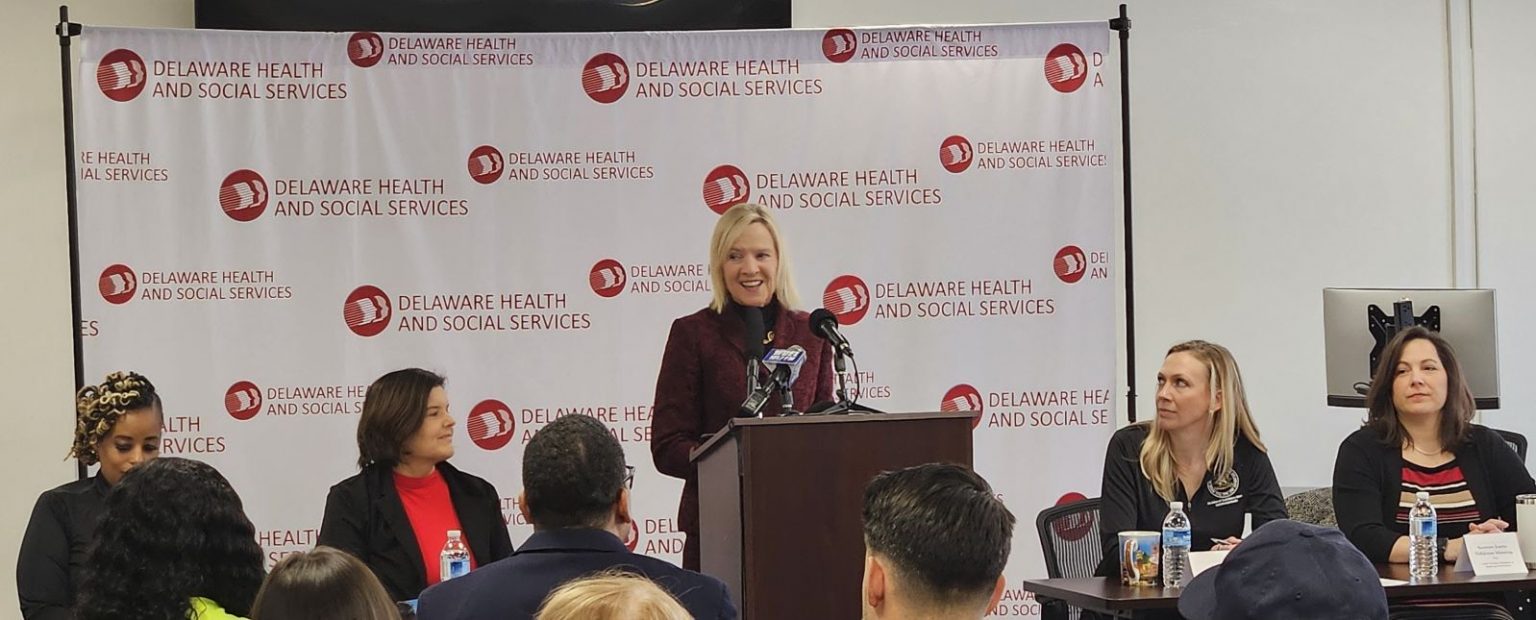
Delaware Officials Underscore Urgency Regarding Individuals Facing Homelessness Related to Substance Use

NEW CASTLE (January 22, 2024) – Today, Lieutenant Governor Bethany Hall-Long and leaders from the Delaware Department of Health and Social Services (DHSS) along with partner community agencies led a community response briefing to provide the latest information regarding the state’s efforts to support individuals facing homelessness and housing instability related to substance use disorder.
Organized by the DHSS Division of Substance Abuse and Mental Health (DSAMH), these quarterly briefings aim to inform the public about the State’s ongoing work to reduce overdoses and respond to the opioid epidemic.
The event was opened by Delaware Lt. Governor Bethany Hall-Long, Chair of the Behavioral Health Consortium, PhD, RN.
“Today, the unfortunate reality is that too many people who are unsheltered and living in encampments, on the street or in cars or motels, are also grappling with substance use disorder or behavioral health challenges. We must develop public policies to support social services and health agencies to meet Delaware’s families where they are. Traditional approaches to service delivery do not always work. If we are going to get real results, we need to meet people where they are and intervene there,” said Lt. Governor Hall-Long. “I’ve been there on the street, working directly with people looking for shelter, and I see them struggling with addiction and other health concerns. We have to continue meeting people directly where they are and provide them with hope, with the tools and services they need to get back on their feet. I’m proud of the innovative work DSAMH and their partners have done and will continue to support them in any way possible while exploring new pathways for safe, secure housing with access to services.”
DSAMH Director Joanna Champney followed the Lt. Governor and presented information about DSAMH’s Recovery Support Scholarships, supported by the Behavioral Health Consortium and available to addiction treatment providers so they can provide short term emergency housing resources to people in their substance use treatment programs. This includes a seven day hotel stay, one-time one-month rental assistance, one-time security deposit, or one month of Oxford House rent.
“Reports from our behavioral health treatment providers indicate that in Delaware, 7% of people starting addiction treatment and 13% starting mental health programs are homeless,” Champney said. “When their housing is unstable, we worry very much that they may disengage from treatment. That’s why we partner with our addiction treatment providers to offer housing support to people already in treatment who are facing an emergency, and it’s why we administer and fund outreach programs for people who aren’t yet engaged in treatment. Our staff and partners try to build relationships and trust with people in the tent cities or who are living on the street. We meet some of their basic needs first. If and when they are ready, we help them connect to services.”
Karen Records, Chief of Social Determinants at DSAMH, provided an overview of Projects for Assistance in Transition from Homelessness (PATH) programs. This program served 675 persons this past grant year – 263 were enrolled through street outreach and 412 were enrolled through supportive service in-reach activities. Clients received connection including but not limited to temporary and permanent housing, substance use treatment, mental health treatment, income assistance, and healthcare insurance access.
Staff from one of Delaware’s service providers, Horizon House, Denise Rodriguez, Program Director, and Kenneth Fassett, Outreach Coordinator, spoke about their services and outcomes of their efforts.
Rachel Stucker, Executive Director for the Housing Alliance Delaware, shared the state’s upcoming efforts regarding the annual Point in Time (PIT) count and information related to serving on Continuum of Care teams.
The event was championed by Eugene R. Young, Jr., Director, Delaware State Housing Authority.
“The Delaware State Housing Authority (DSHA) is proud to work alongside our state agency partners and local nonprofits to address substance abuse in our community,” Young said. “Now more than ever, we need community involvement. From joining the Point In Time count to donating items for hygiene kits or advocating for more recovery homes throughout the state, we all have an opportunity to help Delawareans on the road to a new life.”
Sharon Bell, DSAMH Community Outreach Manager, spoke about the work of her team completing outreach efforts to homeless encampments, making contact with 395 unhoused individuals in 2023. Bell said for donations or inquiries to contact her at [email protected] or by telephone at 302-353-6492. Donations also are accepted at 203 Mitchell Lane in the Springer Building of Herman Holloway Campus in New Castle on Wednesdays 9 a.m.-4 p.m.
Josette Manning, DHSS Cabinet Secretary closed the program with a call to action.
“Addiction can destabilize people in many ways, but one of the most damaging and cyclical aspects is that addiction contributes to homelessness, and homelessness further exacerbates addiction and mental health problems,” Secretary Manning said. “DHSS is committed to helping people access opportunities to escape this cycle. Our programs and partners continue regularly seeking out unhoused people to offer help. Through our outreach, connections to treatment, and temporary emergency housing resources, we offer people a compassionate opportunity to get help.”
To help address behavioral health needs of Delawareans, DHSS has several ways for individuals or their family members to connect:
- Call the 24/7 Delaware Hope Line at 1-833-9-HOPEDE or 1-833-946-7333 – a single point of contact in which callers can connect to a variety of resources and information, including support from clinicians and peer specialists plus crisis assistance.
- Stop by one of DHSS’ Bridge Clinics for an in-person assessment.
- Visit TreatmentConnection.com to find out which treatment providers are located near you.
- Visit HelpIsHereDE.com, DHSS’ one-stop website where Delawareans can search for treatment services and resources in Delaware or nearby states.
- Call 988 if the individual is in crisis and needs immediate support.
- Call 911 if someone has overdosed and needs emergency medical attention.
- Learn where to find Narcan training, get the medication through the mail, and download the OpiRescueDE App here.






